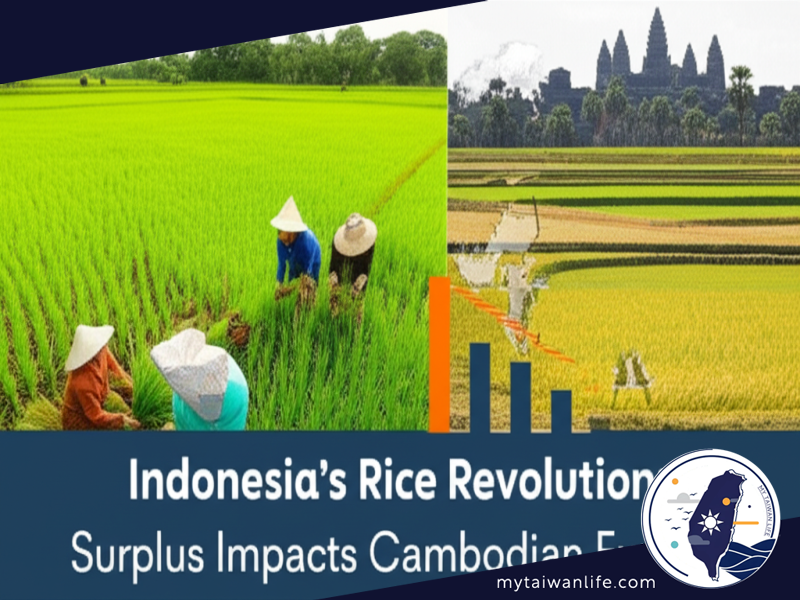Indonesia's Rice Revolution: Surplus Impacts Cambodian Exports
President Prabowo Subianto Highlights Domestic Successes, Shifting Regional Trade Dynamics.

Jakarta witnessed a significant announcement during a recent cabinet meeting led by President Prabowo Subianto. The discussion focused on the implications of Indonesia's booming rice production, particularly its impact on Cambodian rice exports.
President Prabowo revealed that Cambodian Senate President Hun Sen had communicated concerns to Indonesia's Minister of Home Affairs, Tito Karnavian. The core issue stemmed from Indonesia's agricultural success, leading to a reduced need for rice imports from Cambodia.
"Our Cambodian counterpart acknowledged our abundant rice production," Prabowo stated, highlighting the shift in the market landscape. "They noted that this situation would affect their market because Indonesia will no longer import from them."
Prabowo took the opportunity to underscore the Indonesian government’s accomplishments in agriculture. He emphasized the impressive increase in rice and corn production, using the example of South Sumatra, which is projected to see a 25% increase in rice production this year, reaching 4 million tons.
The President emphasized that this achievement served as compelling evidence of Indonesia's effective management during the global food crisis. He further noted that the country's rice reserves were at an all-time high, a testament to the strength of the government's food security strategy.
“This achievement is not a coincidence,” he affirmed. “It is the result of careful planning and hard work at all levels of government.”
Prabowo commended the collaborative efforts among national and regional agencies in overcoming challenges posed by weather patterns, such as El Niño and La Niña, impacting agriculture. He also lauded the utilization of natural resources, citing the Brantas, Bengawan Solo, and Citarum rivers for irrigation as a vital factor in drought mitigation.
A key element of this success has been the wide-scale deployment of water pumps. “The government has provided tens of thousands of pumps to distribute water from major rivers to various regions,” he added.
Other Versions
La revolución del arroz en Indonesia: El excedente repercute en las exportaciones camboyanas
La révolution du riz en Indonésie : L'excédent a un impact sur les exportations cambodgiennes
Revolusi Beras Indonesia: Surplus Berdampak pada Ekspor Kamboja
La rivoluzione del riso in Indonesia: L'eccedenza ha un impatto sulle esportazioni cambogiane
インドネシアのコメ革命:余剰がカンボジアの輸出に影響
인도네시아의 쌀 혁명: 잉여가 캄보디아 수출에 미치는 영향
Rebolusyon sa Bigas ng Indonesia: Ang Labis na Produksyon ay Nakakaapekto sa mga Export ng Cambodia
Рисовая революция в Индонезии: Избыток влияет на камбоджийский экспорт
การปฏิวัติข้าวของอินโดนีเซีย: ผลกระทบส่วนเกินต่อการส่งออกของกัมพูชา
Cuộc Cách Mạng Lúa Gạo của Indonesia: Thặng Dư Tác Động đến Xuất Khẩu Campuchia
Categories
Warning: Undefined array key "article_category" in /web/htdocs/www.mytaiwanlife.com/home/news/sidebar.php on line 125
Deprecated: html_entity_decode(): Passing null to parameter #1 ($string) of type string is deprecated in /web/htdocs/www.mytaiwanlife.com/home/news/sidebar.php on line 125
Warning: Undefined array key "article_category" in /web/htdocs/www.mytaiwanlife.com/home/news/sidebar.php on line 125
Deprecated: html_entity_decode(): Passing null to parameter #1 ($string) of type string is deprecated in /web/htdocs/www.mytaiwanlife.com/home/news/sidebar.php on line 125
Warning: Undefined array key "article_category" in /web/htdocs/www.mytaiwanlife.com/home/news/sidebar.php on line 125
Deprecated: html_entity_decode(): Passing null to parameter #1 ($string) of type string is deprecated in /web/htdocs/www.mytaiwanlife.com/home/news/sidebar.php on line 125
Warning: Undefined array key "article_category" in /web/htdocs/www.mytaiwanlife.com/home/news/sidebar.php on line 125
Deprecated: html_entity_decode(): Passing null to parameter #1 ($string) of type string is deprecated in /web/htdocs/www.mytaiwanlife.com/home/news/sidebar.php on line 125
Warning: Undefined array key "article_category" in /web/htdocs/www.mytaiwanlife.com/home/news/sidebar.php on line 125
Deprecated: html_entity_decode(): Passing null to parameter #1 ($string) of type string is deprecated in /web/htdocs/www.mytaiwanlife.com/home/news/sidebar.php on line 125
Warning: Undefined array key "article_category" in /web/htdocs/www.mytaiwanlife.com/home/news/sidebar.php on line 125
Deprecated: html_entity_decode(): Passing null to parameter #1 ($string) of type string is deprecated in /web/htdocs/www.mytaiwanlife.com/home/news/sidebar.php on line 125

